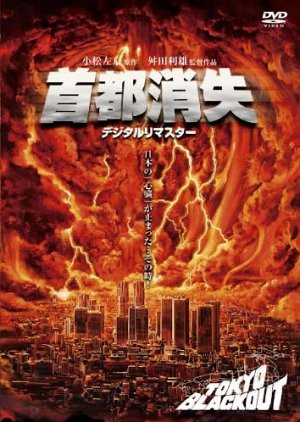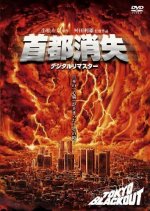- Português (Brasil)
- English
- Español
- 한국어
- Título original: 首都消失
- Também conhecido como: Shuto Shoushitsu , Shuto Shoshitsu
- Roteirista e Diretor: Masuda Toshio
- Gêneros: Ficção científica
Elenco e Créditos
- Watase TsunehikoAsakura TetsuyaPapel Principal
- Natori YukoKoide MarikoPapel Principal
- Yamashita ShinjiTamiya YosukePapel Principal
- Otaki HidejiOhtawara SeiichiroPapel Secundário
- Esumi EimeiTakedaPapel Secundário
Resenhas

You don't know how to forgive yourself
Chances are most of you reading this have never heard of this film before today. It's odd being only the second person on here to review it equally so but I shall do my very best to convey my thoughts to you all. Fear. A primal instinct we as humans all share. Fear of the unknown, fear of the unexplained, fear of anything different to the norm and Tokyo Blackout exploits those fears to the max.A dome-shaped electromagnetic cloud suddenly covers Tokyo. The city becomes totally blocked and isolated from the rest of the world. With the temperature inside the cloud slowly increasing, the Soviet Pacific fleet getting closer and the U.S. forcing Japan to form a new government to help stabilise the situation. Scientists and research workers outside Tokyo must race against time to find out how to get through the cloud, rescue the 2 million lives and the country's fate all before the residents of Tokyo boil alive.
Equal parts Cold War thriller and natural disaster piece, it's another product of the insane imagination of Sakyo Komatsu—the same mind who brought us the likes of Japan Sinks and ESPY. Tokyo Blackout asks the difficult questions about the prospect of never seeing an entire capital city again, how the country would respond, how would its people react and what on earth can we do to possibly return to a sense of normality.
The multitude of plotlines keeps the viewer invested in one way or another. Be it the political outcry from the higher-ups trying to retain some form of order while the government has become unreachable, the ever-mysterious threat of the cloud baffling the scientists at every turn, or the more down-to-earth everyman stories of people simply missing their families and trying everything they can to return to them.
There's a lot here for everyone and anyone and I loved every second of it. Especially a beautiful little personal moment of calm stillness as two friends share a drink over the prospects of never seeing their families again, one barely holding her drink and the other downing it in one, two very different upbringings yet extremely touching as they both recognise each other's faults and guilts through the simple act of sharing a drink.
Directed by Toshio Masuda, a name known to me for a multitude of reasons, be it Tora! Tora! Tora!, Space Battleship Yamato or Prophecies of Nostradamus. You know he's going to deliver a visually striking film and while Tokyo Blackout is one of his more understated pieces it still carries with it some incredible imagery and excellent visual storytelling across the film's 2-hour runtime.
The visual effects from Teruyoshi Nakano are the quality you've come to expect from the ever-proficient man. Even in this upscaled copy, I'm watching, you can tell how much passion he puts into every shot. Granted there are some odd uses of front projection work that don't quite stand up to scrutiny nowadays but the rest of the film is absolutely stunning that it gets a pass. The shots of the US radar plane trying to navigate above the cloud as it's desperate to find out just what on earth it is are stunning, especially during the sequence of every engine slowly losing power and eventually St Elmo's fire is seen by its crew.
The cast all does a great job, there's no one who really stood out to me apart from the so-so English-speaking cast of the production who are laughable at points, nothing new for Japanese cinema at this point though. There are the usual bunch of Toho regulars you've come to expect from these films, Tetsurō Tamba, Tsunehiko Watase, Shinji Yamashita, Isao Natsuyagi and an early appearance from Ittoku Kishibe. Dennis Falt, that Soviet Sub Commander from The Return of Godzilla even makes a brief cameo role this time as a US pilot.
Perhaps Tokyo Blackout's other standout piece is the musical score by French composer Maurice Jarre, the same man who composed the music to Lawerance of Arabia. It's a very rousing and tragic score made all the more impressive by Jarre's limited use of synths lending itself to very easy listening if you can find a copy of the score.
Overall, Tokyo Blackout while being somewhat overly long in the dialogue department at points is a very unique and yet human story that needs way more appreciation than it has currently. Give it a watch when you can.
Esta resenha foi útil para você?
Recomendações
There have been no recommendations submitted. Be the first and add one.









![Kaiju,Tokusatsu,Mecha,etc* [Multi-List]](https://i.mydramalist.com/aEgymt.jpg)
![Kaiju,Tokusatsu,Mecha,etc* [Multi-List]](https://i.mydramalist.com/Zbd0q_4t.jpg)
![Kaiju,Tokusatsu,Mecha,etc* [Multi-List]](https://i.mydramalist.com/YAZ2gt.jpg)
![Kaiju,Tokusatsu,Mecha,etc* [Multi-List]](https://i.mydramalist.com/9xYJyt.jpg)
![Kaiju,Tokusatsu,Mecha,etc* [Multi-List]](https://i.mydramalist.com/xbjEr_4t.jpg)




